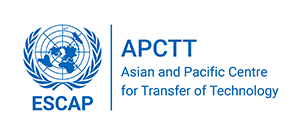The Asian and Pacific Centre for Transfer of Technology (APCTT) was established on July 16, 1977, in Bangalore, India, as the Regional Centre for Technology Transfer (RCTT). Its primary mandate was to enhance technology innovation, transfer, and adoption across the Asia-Pacific region. In 1985, the Centre was renamed APCTT. In 1993, it relocated to New Delhi under a host country agreement with the Government of India.
Over the decades, APCTT has evolved its focus and initiatives to respond to the changing needs of its member States.
In its early years, the Centre prioritized strengthening science, technology, and innovation (STI) policies while increasing access to technology information. This period saw the introduction of initiatives like the Technology Atlas Project, a decision-support tool for policymakers, and the launch of the Asia-Pacific Tech Monitor, which consolidated regional technology insights.
During the 1990s, APCTT expanded its focus to promote environmentally sound technologies and facilitate technology transfer, particularly for small and medium enterprises (SMEs). It pioneered projects like the Technology Bureau for Small Enterprises and developed S&T Entrepreneurship Parks and Technology Business Incubators, laying the groundwork for entrepreneurial innovation in the region.
In the 2000s, APCTT emphasized National Innovation Systems, fostering regional networks such as the Biotechnology Information Network for Asia (BINASIA) and the Asia-Pacific Traditional Medicine and Herbal Technology Network (APTMNET). These initiatives connected research institutions, policymakers, and industry stakeholders, driving collaboration in critical areas like biosciences and traditional medicine.
The 2010s marked APCTT’s focus on sustainable development, with significant projects in nanotechnology, renewable energy, and sustainable agriculture. The Centre established mechanisms like the Renewable Energy Cooperation-Network for the Asia-Pacific (RECAP) for technology cooperation.
Since 2020, APCTT has aligned its efforts towards enhancing capacities and fostering regional cooperation for technology transfer on technologies for climate-resilient technologies, renewable energy, air pollution control, and the adoption of Fourth Industrial Revolution (4IR) technologies.
APCTT’s rich history reflects its adaptability and commitment to advancing innovation and technology transfer across diverse sectors and geographies. From early efforts in policy support to its current role in driving cutting-edge technologies, APCTT has consistently supported member States in leveraging technology for sustainable and inclusive development. With a strong legacy of facilitating regional cooperation, APCTT continues to serve as a vital bridge between technology providers and seekers, driving sustainable development across its 53 member states and 9 associate members.

